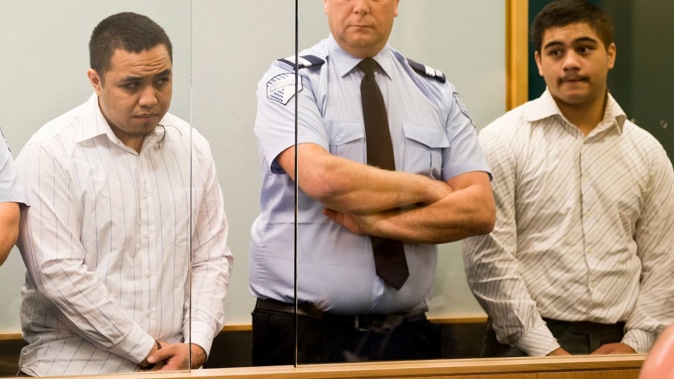

A man jailed for murder as a teenager has compared being in a gang to the game of rugby, saying not everyone in the Crips ends up living a life of crime.
“It just sucks that we get associated with people who do crime,” Joel Lo told the New Zealand Parole Board after coming up for parole for the first time since being jailed in 2014.
“It’s just like how some rugby players choose to do drugs, but that doesn’t make the game of rugby a bad sport. It’s the same as this.”
Lo was just 17 and his friend John Adams, 15, when they beat Tamati Tupe to death on an Auckland street in early hours of September 2012. The pair had been drinking heavily and attacked the 23-year-old mechanic without provocation, though Adams was the main offender with a judge noting he kicked the victim’s head “like a football”.
Both teens were given life in prison. Lo’s came with a minimum non-parole period of 12 years but he successfully quashed his life sentence in August this year meaning his full sentence will expire in 11 months and he’ll automatically be released from prison.
While Lo wasn’t actively seeking parole during yesterday’s hearing, board members expressed their concern about his attitude and involvement with the Crips and how he’d cope with those challenges when he is released.
“I’ve got to say I’m really worried about your responses today,” board chairman Sir Ronald Young said.
 Tupe's body was found on Hillside Road, Mt Wellington in September 2012. Photo / Steven McNicholl
Tupe's body was found on Hillside Road, Mt Wellington in September 2012. Photo / Steven McNicholl
“I wish you would think really carefully about the gang, I don’t think it’s a good thing in the future for you.
“There’s a reason why a third of the prisoners in New Zealand are gang members, that’s because they commit crimes far more often than anyone else, and far more often than rugby players.”
Lo, however, maintained that being in a gang wasn’t necessarily synonymous with being a criminal.
“I feel like I’m my own man and I can make my own choices,” he said.
“The Crips will always be a part of me.”
When questioned about how he planned to avoid gang confrontations or pressure from associates within the gang, Lo said that he was able to make his own choices and that many of the men in his “team” were making positive choices in their lives rather than engaging in a life of crime.
“No one is going to put a gun to my head and force me to do something I don’t want to do,” he said.
Lo’s lawyer, Ella Burton, urged the board to consider the fact that her client had been imprisoned at a young age and gang membership was often a way for inmates to cope with prison.
“While he has made those comments, he has had to live in a violent environment and manage,” she said.
“That may go some way to his mindset in terms of the purpose of gang membership.”
Lo was asked about the night of the murder which he described as a “stupid choice”.
“I look back and it’s just like … I can’t really say much, it was just a stupid decision on my part,” he said.
“If I ever get the chance to go and apologise to this family then I’ll take that opportunity.”
Lo was also asked about what he’d learnt in prison after having completed programmes for drug and alcohol dependence as well as violence.
“I love myself more than if I didn’t get some help and some guidance from these courses,” he said.
“I feel like I’ve just grown up, learning more about myself, learning more about what I want for myself in the future. Just like a whole self-discovery journey I guess, that’s what prison has given me.”
Crips are ‘good people’
However, multiple board members kept returning to his gang membership as an issue.
“We know that people who leave prison and continue to be in gangs, they have a much higher chance of coming back to prison … the same is not true of rugby,” board member Dr Jeremy Skipworth said.
“You’ll be tested when you leave prison if you remain in the gang.”
Board member Julia Ioane was also concerned about his involvement with the Crips.
“To be honest I’ve been listening to your answers and I have to say I’m pretty worried,” she said.
Lo said he trusted the Crips as they are “good people” and that he chooses to “call my brothers”.
Young asked Lo why he needed to be in a gang at all.
“These people have been with me since I was young,” Lo said in response.
Young said he thought Lo had “completely the wrong approach” and he needed to reflect on the fact he played a part in killing a man.
“That brings with it some responsibilities about the way you live your life, out of respect for him,” Young said.
“I think you’ve got a lot of thinking to do, a lot of thinking.”
Lo will appear again before the board in July next year but will be released regardless of the outcome of that hearing when his sentence expires in 11 months.
Jeremy Wilkinson is an Open Justice reporter based in Manawatū covering courts and justice issues with an interest in tribunals. He has been a journalist for nearly a decade and has worked for NZME since 2022.

Take your Radio, Podcasts and Music with you









